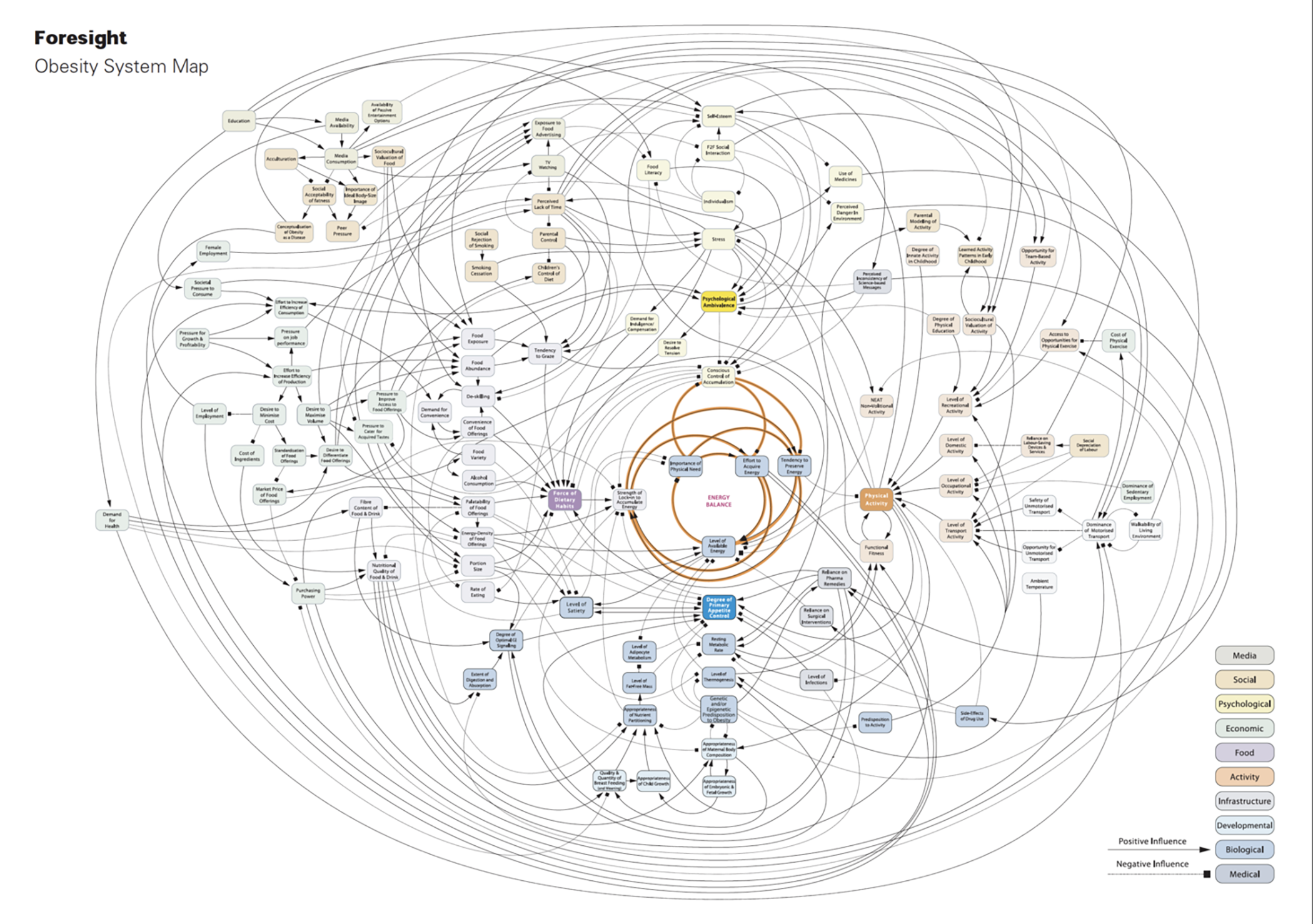Obesity and overweight result from a complex network of social and biological factors that have revealed an inherent human vulnerability to weight gain. Specific behaviors that contribute to obesity include unhealthy nutrition, physical inactivity, eating out of home, unhealthy snacking, sugar-sweetened drinks, breakfast omission, sedentary lifestyle, and energy imbalance.
Multiple reports and studies have emphasized the importance of social determinants as fundamental influences on health and disease, and particularly on the growth of obesity rates. These social determinants include factors reflecting socio-demographic (gender, race/ethnicity) and psychosocial (stress, workload, depression and anxiety) influences, social structures, and the environment. An obesogenic environment is believed to boost the prevalence of obesity.

The full obesity system map with thematic clusters according to Foresight, 2017.
Available from: https://foresightprojects.blog.gov.uk/
It is a well-established fact that over the past four decades, Saudi Arabia has witnessed rapid urbanization and changes in socio-economic status, shifting away from traditional customs towards more westernized behaviors such as dietary changes, sedentary lifestyle, eventually leading to high levels of overweight and obesity. According to United Nations Development Programme (UNDP, 2020), with one of the youngest populations in the world, where 51% of the 33.4 million people are under 25 years of age, Saudi Arabia has one of the highest obesity and overweight prevalence rates; seven out of ten people are experiencing this health condition. Saudi Arabia’s obesity prevalence is higher than the regional average of 10.3% for women and 7.5% for men. The regional comparison of obesity rates in Saudi Arabia indicated that numbers vary with the highest rates of obesity in the Eastern Province (29.4%), followed by Riyadh (26.9%), with the lowest rates being reported in Baha (14%) and Asir (18%).
Studies of the relationship between dietary habits, sociodemographic, and lifestyle characteristics among Saudis have shown that adherence to a healthy diet is associated with being male, having education, high income, and being elderly. Traditional eating patterns were associated with male gender and marital status, while frequent consumption of dates and coffee was associated with skipping the daily meal. Although research on health literacy has grown in recent years, there are limited data about nutritional knowledge and attitudes in relation to healthy lifestyle among the general public of the Kingdom. The influences of nutritional knowledge on attitudes and ultimate food choice are still important research topics among Saudis.

The prevalence of overweight and obesity among Saudi males & females in different regions of the Kingdom (Woodman A, 2022).
Several systems or contexts determine human behavior, including the environment, the educational system, the society in which the person is active, social groups, traditions and culture. Hence, studying the relationship between knowledge and attitudes towards nutrition may offer one possible way to better understand the impact of multiple factors on the eating behavior of Saudis and the actual reasons behind the shift from a traditional diet rich in fiber to unhealthy foods. On the final note, this approach to research, policy, and practice will be a state-of-the-art process, requiring changes in philosophy and practice with the participation of researchers, professional evaluators, target population, and funders, thereby educating a healthy, competent, and self-reliant generation who will achieve the goals of Saudi Vision 2030.




